Our dog Oscar, an 8-year-old rescue with a fast-graying muzzle, is the most laid-back dog we’ve ever had. He loves to play, but generally with himself by tossing sticks up into the air. If another dog wanders onto our property, he observes from the porch. He does not take his guard-dog duties seriously — we’ve heard him bark less than 10 times in his life. He’s a great camping, sit-around-the-fire, calmly-sit-in-the-kayak kind of dog.
So, you can imagine my surprise when Andrew burst in the door around 10pm from his evening walk with Oscar and exclaimed, “Oscar just pounced on a possum out in the yard! I can’t tell if he killed it!” Apparently, Oscar suddenly decided that it’s nocturnal marsupials, not unfamiliar cars, that we need protection from, and so he jumped on the possum waddling across the yard and held it down with his mouth.
Andrew and I went outside to look at the possum:
It didn’t look dead, but it also wasn’t running away. Shouldn’t it run away now that the dog isn’t nearby? We went back inside to let it stop acting dead and make its escape. After 5 more minutes, this is what we saw:
Does this mean Oscar really killed it? The possum hadn’t moved!? Another 5 minutes go by….
And so that’s when I began to wonder, How long do possums play dead? and…
How can you tell when a possum really IS dead?
OK, so the first thing I discovered when I researched this is that what we had in our yard was an Opossum, not a possum. Possums are from New Zealand, Australia, and China, and while both are marsupials, the golden-brown Possum does not play dead when cornered. It’s also much cuter than the American Opossum:
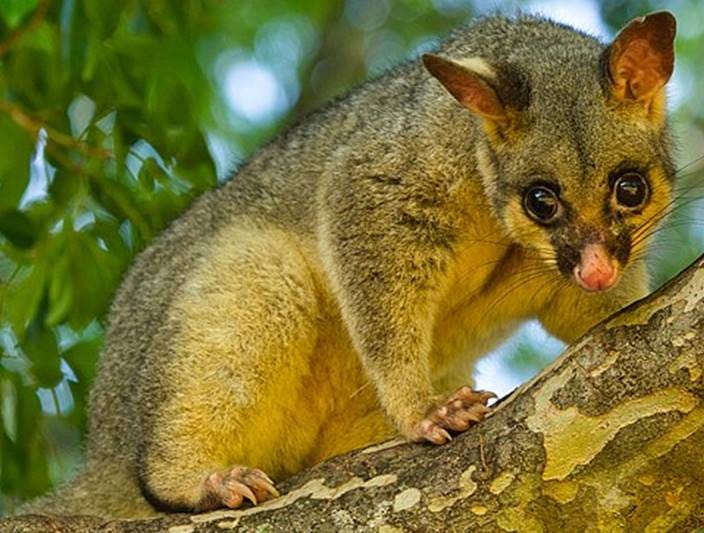
The second important fact I discovered about opossums is that they are not “acting” dead and aren’t choosing to do so. It’s an involuntary reaction that causes them to stare with their eyes open and tongue sticking out. The opossum in our yard didn’t get up when Oscar went back inside because it couldn’t. It was in a comatose state. Their feet curl up, their eyes glass over, their tongue hangs out as if they’ve taken their last breath. Apparently, you can nudge them with your foot or even pick them up without their moving or resisting. They’re stuck in a comatose state until their body works its way out on its own, which can take as long as FOUR HOURS.
This is not a healthy response to the shock of an oncoming car, and probably explains why there are so many opossums as roadkill.
While “playing dead”, opossums also give off a foul odor that smells like a decaying corpse. This is supposed to lend credence to the premise that they’re dead, making them less desirable for another animal to eat. The smell is similar to an animal that’s been dead long enough to begin rotting.
Even baby opossums will keel over in a coma when stressed. The reaction is similar to what happens with fainting goats, although the goats only stay down for around 30 seconds or so and never lose consciousness like opossums do.
While in shock, the opossum can’t blink its eyes and if it were bitten by a predator, it wouldn’t feel pain. Which brings me to another interesting fact I learned – opossums are immune to rattlesnake venom because “a protein in their blood binds to the toxins and neutralizes them.” Scientists have found that isolating this protein and combining it with the venom before injecting it into mice makes the venom ineffective. This special opossum protein is being studied by scientists as a possible alternative to antivenom, which is very expensive to produce.
On the very day I was writing up this newsletter, Oscar had another opossum encounter. He and I were toward the end of a 6-mile hike at our local state park when I saw him race ahead and then bounce two feet into the air like he was on a trampoline at the state fair:

This apparently did not impress the opossum that turned out to be the object of his affection. It did not keel over in a coma, but instead just hissed and growled while glaring angrily at us both:
My first thought was that there might be something wrong with this particular opossum – maybe it has rabies? That could explain why it’s out during the day and also why it’s not responding by going into a catatonic state. However, it turns out that opossums are resistant to rabies. When cornered, they may hiss and drool while swaying on their feet, which can give the impression that they have rabies. I suppose this scares off predators – it worked on me, at any rate.
Perhaps this opossum couldn’t be bothered to faint – Oscar and I must not have looked to be worth the effort.
So, the answer to my question about how to tell if an opossum is REALLY dead is, I suppose, wait at most four hours and if the opossum is still stiff, glassy-eyed, and smelly, you probably have an actual dead opossum on your hands.
Weird Nature of the Week


Detritus
This might be the tiniest, cutest Australian possum ever.
More about the difference between possums and opossums
It is true that mother opossums carry their babies on their backs, as you can see in this short video.
I bet you’ve always wondered what the Mona Lisa would look like if she’d been an opossum
Any funny or weird animal encounters you’ve experienced? Have you smelled a catatonic opossum? Ours didn’t smell, so I’m curious about whether it really does smell like rotting roadkill…



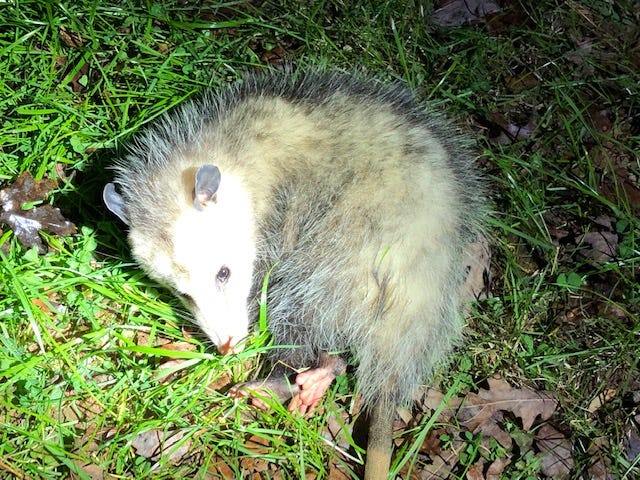
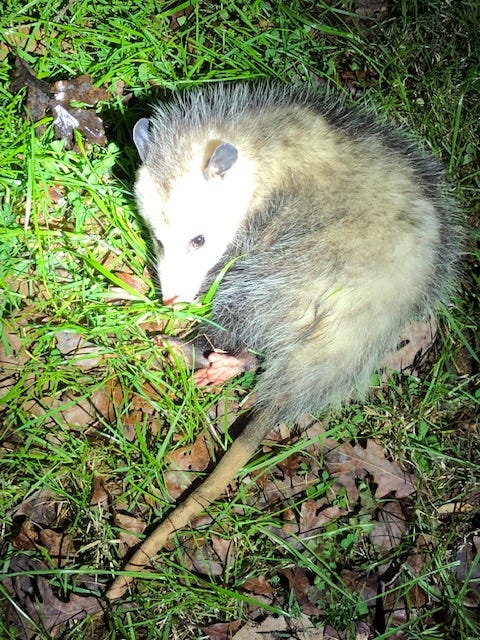
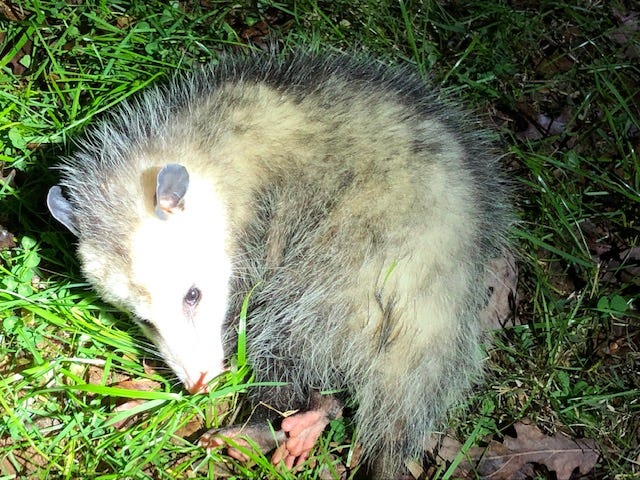
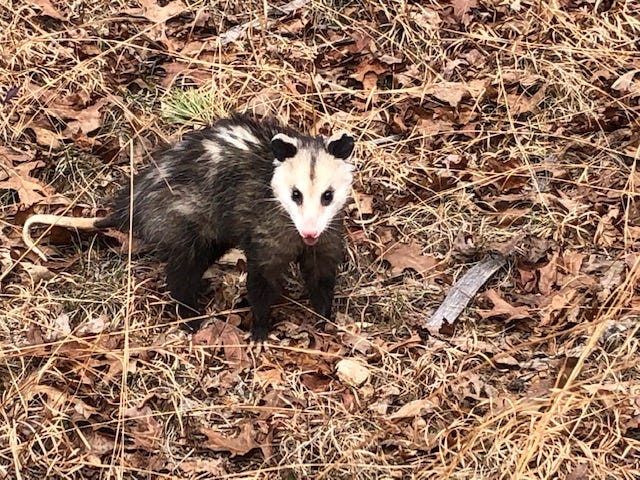
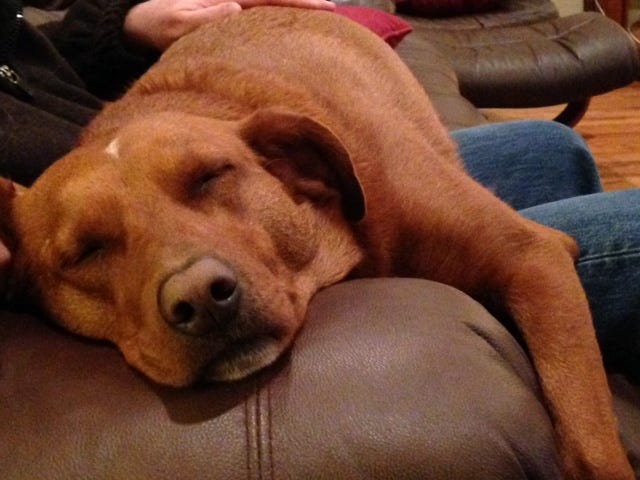
Love it. As you know in New Zealand possums are a super-pest, and can get quite aggressive. My uncle used to tell me as a young boy that if you were ever in the bush and a possum attacked you, you should lie on your back and raise your leg in the air. Then, the possum will run up and attack your boot, rather than your head. I have no idea if that is true to this very day.
That's really fascinating - what an unusual response to predators, but it must work.